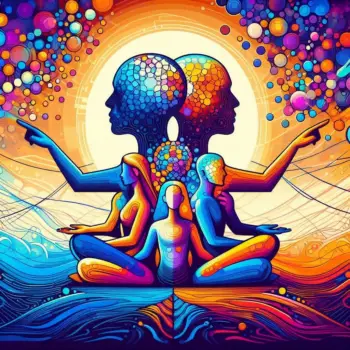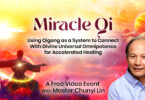By Dakota Flynn
Staff Writer for Wake Up World
The Default Mode Network (DMN) is a network of brain regions that becomes active when our minds are at rest, not focused on external tasks. This network includes the medial prefrontal cortex, posterior cingulate cortex, and angular gyrus. The DMN is responsible for daydreaming, self-referential thoughts, and helping to construct our self-identity. Our ego-driven narratives, personal history, and future aspirations are woven together within this mental space.
The DMN and the Illusion of Self
While the DMN plays a crucial role in creating the narrative of “me” and “my life,” it also reinforces the illusion of a separate self. This illusion is the foundation upon which the ego builds its fortress, creating a sense of separation from the world and others. The DMN’s activity often leads to rumination, worry, and a constant inner dialogue that keeps us trapped in the mind’s web of thoughts.
In the context of self-realization, the DMN can be seen as both a tool and a hindrance. It helps us navigate the world by creating a cohesive sense of identity, but it also binds us to the false notion that we are nothing more than this collection of thoughts, memories, and desires. The DMN’s self-referential loop reinforces past experiences, projecting them onto future expectations and solidifying the belief that these mental constructs define who we are. This process often blinds us to the present moment, where the true self resides, and instead keeps us anchored in a limited, ego-centric perspective. Moreover, the DMN fosters the illusion of control, leading us to believe that we can somehow manage and predict our lives by clinging to these narratives. Yet, this illusion only deepens our sense of disconnection, as the true self is not found in the repetitive patterns of the mind but in the expansive awareness that exists beyond them.
The Role of Self-Inquiry in Unveiling the True Self
Self-inquiry is a powerful practice that can help us dissolve the illusory self-created by the DMN. By repeatedly asking, “Who am I?” we begin to peel back the layers of conditioning and mental constructs that define our identity. This process allows us to see that the self we often identify with is merely a product of the mind, not our true essence.
Breaking Free from the DMN’s Grip
As we engage in self-inquiry, we notice the habitual patterns of thought that the DMN perpetuates. Thoughts like “I am not good enough,” “I need to be successful,” or “I must protect myself” are all products of the DMN’s self-referential loop. Observing these thoughts without attachment creates space between the mind and our true self. This space is where true freedom lies.
Through consistent practice, the DMN’s grip on our identity loosens. We begin to experience moments of stillness and peace, where the mind’s chatter subsides, and a deeper sense of being emerges. This beingness is not bound by thoughts or stories; it is the pure awareness that exists beyond the DMN’s activity.
The Intersection of Science and Spirituality
The exploration of the DMN and self-identity beautifully illustrates the intersection of science and spirituality. Neuroscientific research on the DMN provides valuable insights into how our brains construct a sense of self, while spiritual practices like self-inquiry offer pathways to transcend this constructed identity.
Transcending the Mind’s Limitations
Understanding the DMN from a scientific perspective can enhance our spiritual journey. We recognize that the thoughts and narratives arising in our minds are not the ultimate truth but rather a byproduct of brain activity.
By integrating this understanding into our spiritual practice, we can transcend the limitations of the mind and experience the vastness of our true nature. This transcendence is the essence of self-realization—a state in which we no longer identify with the egoic mind but rest in the awareness of our true self.
Psychedelics and the Default Mode Network (DMN)
In recent years, the intersection of psychedelics and neuroscience has provided valuable insights into the functioning of the Default Mode Network (DMN) and its role in shaping our sense of self. Psychedelics, such as psilocybin, LSD, and ayahuasca, have been shown to temporarily reduce the activity of the DMN, offering a unique window into how the brain constructs the ego and the illusory self.
When the DMN’s activity is reduced, individuals often report a dissolution of the boundaries between the self and the external world, known as “ego dissolution.” This state can lead to profound experiences of interconnectedness, where the usual sense of being a separate, isolated individual fades away. From a spiritual perspective, this is strikingly similar to the insights gained through self-inquiry and meditation—where the constructed self is recognized as an illusion and a deeper awareness of unity with all things emerges.
The Role of Psychedelics in Loosening the DMN’s Grip
Psychedelics offer a temporary disruption of the DMN’s typical patterns, which allows individuals to experience a state of consciousness free from the constant self-referential loop. This loosening of the DMN’s grip can create a sense of “no-self,” where the ego’s rigid narratives dissolve, leading to insights into the nature of existence and consciousness. This is often described as a spiritual awakening or a mystical experience where the individual feels a deep connection with the universe.
Unlike self-inquiry, where the process of questioning gradually loosens the ego’s hold, psychedelics can accelerate this shift in perception by directly altering the brain’s activity. The DMN’s typical functions—such as self-reflection, planning, and maintaining the narrative of “me”—are temporarily quieted, allowing for a more expansive state of awareness.
Psychedelics and the Expansion of Consciousness
While psychedelics can offer profound glimpses beyond the ego, they are not a permanent solution to transcending the DMN. After the effects of the substance wear off, the DMN’s activity generally returns, and the ego resumes its familiar patterns. However, the experiences facilitated by psychedelics can offer valuable insights and help catalyze long-term changes in one’s perception of the self and reality.
For individuals engaged in spiritual practices like self-inquiry, these experiences can serve as a catalyst, providing a reference point for what lies beyond the ego’s illusions. When combined with ongoing practices, such as meditation and mindfulness, the temporary dissolution of the ego during a psychedelic experience can be integrated into a deeper understanding of the self and the mind.
Psychedelics, DMN, and Self-Realization
Though psychedelics can provide a glimpse of ego dissolution, the true path to self-realization lies in the continuous practice of self-awareness, inquiry, and meditation. Psychedelics may open the door, but the lasting realization that thoughts or narratives do not bind the self requires a consistent engagement with the present moment and the conscious unraveling of the mind’s constructs.
In this sense, psychedelics can be seen as tools that momentarily disrupt the DMN, offering a taste of what is possible beyond the ego. However, the deep, abiding sense of peace and freedom that arises from self-realization comes from an ongoing exploration of the true self. This journey transcends the mind’s limitations and the temporary effects of any substance.
Conclusion – Embracing the Journey of Self-Inquiry and Expanded Awareness
The Default Mode Network (DMN) plays a key role in shaping our sense of self, but it is not the whole story of who we truly are. While psychedelics can offer a temporary glimpse beyond the DMN’s constructs, the lasting realization of our true nature requires a continuous practice that transcends momentary shifts in consciousness. Self-inquiry is one such path, but it is not the only way to reveal the true self.
In addition to self-inquiry, stillness, meditation, and mindfulness help quiet the mind and create space for a deeper awareness of the true self to emerge. Contemplation and inquiry into the nature of consciousness allow us to peel back the layers of conditioning and ego-based identity. Similarly, surrendering or letting go of control, engaging in selfless acts of service, and practicing gratitude shift us away from ego-driven desires and into the present moment, where the self is most easily recognized.
Other practices, such as breathwork, silence, and heart-centered devotion, also dissolve the ego’s grip, leading us to experience the expansive state of being that exists beyond mental constructs. Creative expression in a flow state can similarly quiet the mind, allowing the true self to surface in moments of inspiration.
Ultimately, these practices—whether they involve introspective inquiry or external service—are all pathways to transcending the limitations of the DMN and the ego. They guide us to the awareness that we are not defined by thoughts, stories, or the mind’s narratives but by the infinite, timeless consciousness that underlies all existence. By integrating these approaches into our lives, we embark on a transformative journey toward self-realization—where peace, freedom, and our true nature are fully realized, beyond the boundaries of the mind.
Scientific References
- Default Mode Network Modulation by Psychedelics: A Systematic Review – ncbi.nlm.nih.gov/pmc/articles/PMC10032309
- The default-mode, ego-functions and free-energy: a neurobiological account of Freudian ideas – ncbi.nlm.nih.gov/pmc/articles/PMC2850580
- Self unbound: ego dissolution in psychedelic experience – https://www.ncbi.nlm.nih.gov/pmc/articles/PMC6007152/
About the Author
Dakota Flynn is an esoteric writer who blends metaphysical insights with practical guidance. Her writings explore the depths of human experience, inspiring readers to uncover their inner truths and grasp their fundamental nature. By highlighting the interconnectedness of life, she helps individuals achieve an understanding of their existence. Dakota’s work serves as a guiding light for those on a path of spiritual growth, providing valuable tools and wisdom for transformation and self-discovery.
Still Trading Time for Money? There’s a Better Way.
You’ve always known the system was broken. Working harder doesn’t equal more freedom—it just keeps you stuck in someone else’s game.
It’s time to opt out.
The Freedom Formula isn’t another get-rich-quick scheme. It’s a proven business model backed by a 50-year-old company, designed for people who refuse to be trapped by outdated financial systems.
? Earn high-ticket commissions (57%+ per sale) with a business that actually helps people
? Leverage a system where our team closes your first $100K in sales for you
? Unlock passive, recurring income—so you can live life on YOUR terms
This is about sovereignty, not survival. No bosses. No begging for raises. No soul-sucking work that drains your energy and purpose.
Automation and AI are making traditional jobs obsolete. Most people will wait and hope for the best. But you? You see the shift happening.
Watch the FREE masterclass now and take back control of your future.
If you’ve found value in our articles, we invite you to support the release of our brand-new book, “Gratitude Practices for Kids: A Practical Guide for Adults to Instill a Spirit of Appreciation and Positivity in the Next Generation.“
“Gratitude Practices for Kids” brings together over 25 innovative and accessible practices designed to enhance gratitude in everyday life. This comprehensive guide is backed by 17 scientific studies, ensuring each concept is grounded in research, underscoring our commitment to nurturing growth, emotional intelligence, and positive interactions between adults and children.
We encourage you to opt for the paperback version to celebrate this new release. Dive into its fresh pages away from digital distractions, allowing you to immerse yourself in the transformative practices it offers.
Over recent years, Wake Up World has faced significant online censorship, which has impacted our financial ability to operate. Moving into book publishing represents a strategic step to secure the ongoing funds needed to continue our mission. By purchasing Gratitude for Kids, you help us keep our content free and accessible to everyone, avoiding needing a paywall. With over 8,500 articles published in the last 13 years, we remain dedicated to keeping our valuable content open to all.









